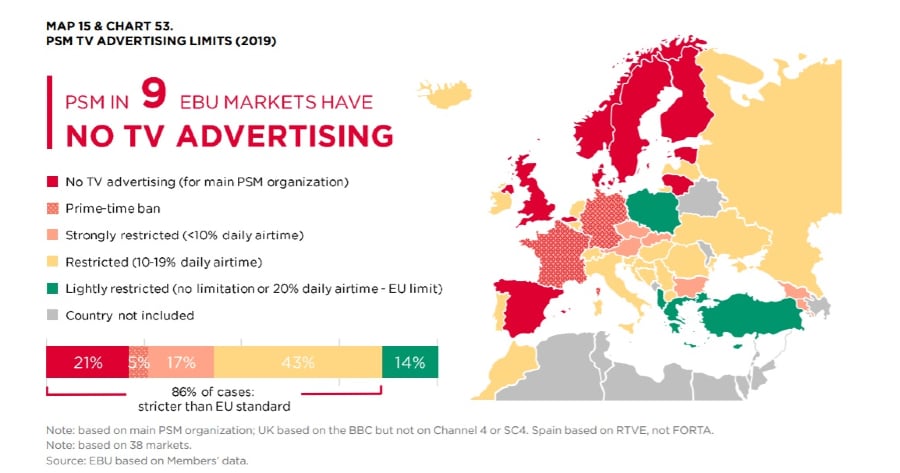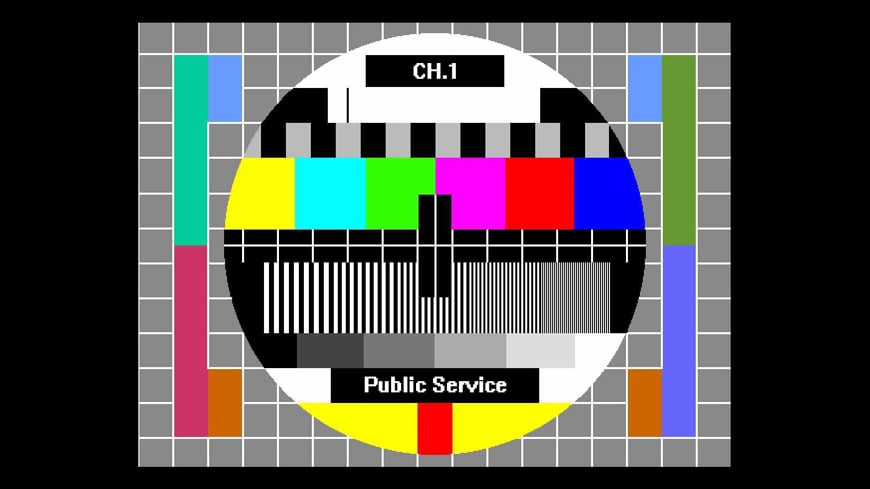The European Public Service Media stands on three financial pillars: government resources, citizen donations, advertising and other commercial activities.
A certain variety of mechanisms allows us to talk about the so-called mixed model of public broadcasting financing.
The European Broadcasting Union (EBU) in its analysis “Funding of Public Service Media 2019” analyzes data on its members from 48 countries in the European and Mediterranean basin (radio and television).
The data used in the report reflect the trends of the last 5-7 years.
According to the report, 77.7% of broadcasters receive public resources, of which 62.7% are licenses and 18.7% are commercial entries, where the share of advertising is 9.8%.

Photo from “Public Broadcasting Financing 2019” report
Let’s continue the story with numbers: 22 broadcasters in the EBU are budgeting based on license fees, i.e. directly from citizens.
31 broadcasters are funded from the state budget and other public sources, such as taxes and government grants. And only one broadcaster (the Republic of Malta) receives 52% of its revenue from advertising.
There is no single standard, every broadcaster has its own story and environment. In the Vatican and Azerbaijan, for example, the state finances 100% of the public broadcaster’s budget. In Finland, too, the state spends 97% of public television’s budget, or more precisely, it is the percentage of income tax that came in 2013 to replace license fees.
Until recently, that number was comparable to 95% of budget funding in Armenia, but amendments were made to the law in the spring of 2020, which returned advertisement to television.
The Czech public broadcaster receives 90% of license fees, and in a sense is a classic example of a European public broadcaster (PSM).
How is the budget of public broadcasters formed?
The Czech TV budget for 2020 is 5.670 billion Czech korunas, which is about 210 million euros today. Financial resources are an important component of television independence. The main resource is license fees. The population pays them in accordance with the Law on Radio and Television Tariffs. The amount of TV fee per month is 135 Czech korunas (about 5 euros), for radio you need to pay 45 korunas.
Any individual (actually a household) or legal entity is required to pay this tax if it has a television or radio receiver or another device capable of receiving a television or radio signal (except for a computer).
Every potential taxpayer must declare the existence of such a device in his home, office or car.
In case the information is hidden and the fact of avoiding payment is found, a fine of 5000 korunas (radio) and 100 000 korunas (television) is imposed.
Patent fees are not very pleasant, but from an economic point of view, they are not a big expense for Czech families. Some groups and organizations of the population are exempt from this type of tax. For example, citizens whose income is 2.15 times lower than the minimum living requirements, who do not have the right to permanent residence. Also, people who are completely deaf or blind, as well as schools and broadcasters.
This type of tax is considered by intellectual circles, liberal politicians and public broadcasters to be a guarantee of independence and protection from political influence.
Some politicians often claim to change the use of the license fee, in an attempt to cancel the direct funding of the budget, and television.
Recently, Czech President Miloš Zeman proposed to “nationalize” Czech television. But the leadership is not ready to change the status of television and emphasizes that it is not the guardian of individual parties and individuals, but the guardian of the public interest.
Jan Bednář, who was chairman of the Czech Television Council until March 2020, is convinced:
“If the broadcaster receives licensing fees, that is, has a stable income without any dependence on the economic situation or a crisis … the funding of public broadcasting is unique and not an easily solvable problem. Czech politicians put television broadcasting in a difficult situation. When it is necessary to increase the license fees, they do not want to do it.”
Transfers made to television in 2019 accounted for 90% of the budget of Czech television. It is the largest but not the only source of income. Czech television can be engaged in entrepreneurship, which is associated with the main activity. These include, for example, copyright sales, sponsorship fees or barter, and advertising.
How does advertising work?
Advertisements have gradually moved away from Czech television.
The number of advertisements that are allowed during programs for commercial reasons has been slowly cut down, and their volume has been limited. Licensing fees have increased from 75 to 100, and then to 135 in 2008.
Advertising played a major role for Czech television in the 1990s. Jan Bednář says that “30 years ago, Czech television had incomparably more advertising, its volume was reduced by the decision of the Czech parliament.”
“Private broadcasters welcomed the move. They did not want to see advertisements on public broadcaster’s channels and lobbied for the decision, which led to a drop in the share of Czech television in the advertising market in favor of private TV channels. “
In 2008, Czech television could no longer use its advertising revenue for its own purposes. Part of the proceeds went to the State Fund for Cinematography Development, and the other went to the digitalization of its own broadcast.
The lobbying of big commercial channels reached its next goal in 2012, when advertising was allowed in only two of the six channels of the public broadcaster: ČT2 and ČTsport.
However, this right has significant limitations. First of all, the volume of advertising can not exceed 0.5% of airtime, which is 7 minutes and 12 seconds a day. At the same time, in the prime time, i.e. from 7:00 pm to 10:00 pm, the programs can be supplemented with no more than 6 minutes of advertising.
For comparison. Advertising on commercial channels may not exceed 12 minutes per hour.
Advertising on the public channel cannot interrupt the programs, and the unused time can be transferred to other programs.
The advertising revenue of the second channel of Czech television is transferred to the State Cultural Fund every four months, aimed at the development of Czech film production. Only administrative expenses related to the placement of advertisements are kept.
ČT4 sports channel advertising-income is used for the production and procurement of sports programs.
Advertising is also regulated on public television websites. According to the law, it can be present only in the audiovisual services department on demand.
The former head of the Czech Television Council Jan Bednář is convinced that the public broadcaster should not have the right to place advertisements. “I would give up that idea, I don’t think we should have ads at all …”
Advertising on Czech radio can be posted on four national, four special and 14 regional stations. But there are serious limitations here as well: up to 3 minutes per day for national and up to 5 minutes for regional stations.
Crisis of the model?
Disputes over PSM funding are endless both within the country and at the level of international industrial, public and political organizations. This applies to both public and commercial sources.
Various countries increase, decrease or even refuse licensing fees altogether and fix them regardless of the availability of receiving devices, taking into account the digital changes. They import special taxes, connect broadcasters with the state budget, give them the right to broadcast advertisements or deprive them of that right, establish serious restrictions on the volume and even the content of advertisements.
The main argument for the critics of the mixed funding model of public broadcasting is the simple formula. If public sources are a guarantee of the existence of an independent public broadcaster, then the money of the advertising market is the oxygen of commercial broadcasters.
Nouneh Sarkissian







